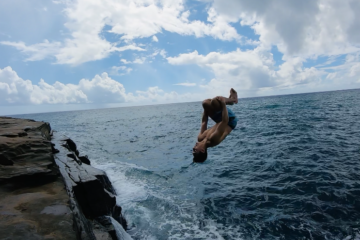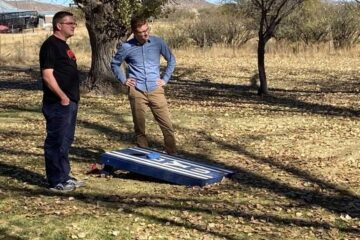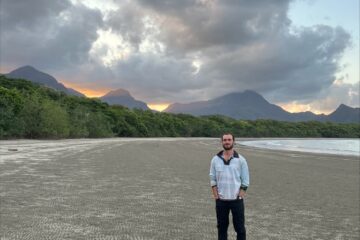The digital nomad lifestyle has transformed from a niche way of living into a widespread movement, especially in the aftermath of the global pandemic. In our latest episode of Journey with Jake, we dive deep into this fascinating world through the experiences of Ryan Mellon, a digital nomad coach who helps others create location-independent careers.
Ryan’s journey began with burnout – working 14-hour days, six days a week, splitting his time between fixing deep fryers at a fast-food restaurant and working the night shift at UPS. For over ten years, he maintained this grueling schedule until a pivotal two-week vacation to Costa Rica completely changed his perspective. That brief international experience opened his eyes to the possibility of a different way of living, one where work and travel could coexist harmoniously.

Photos Courtesy of Ryan Mellon
What makes Ryan’s story particularly compelling is how methodical his transition was. Rather than making an impulsive decision, he set a one-year timeframe to prepare, save money, and plan his exit strategy. This culminated in a year-long RV trip across 23 American states with friends, during which he discovered he could leverage his real estate license to work remotely. This realization was transformative – he didn’t have to return to his exhausting jobs because he could generate income while traveling.
The digital nomad landscape has evolved tremendously since Ryan first embarked on his journey. Today, he identifies three distinct categories of digital nomads: employees who work remotely for companies, freelancers who provide services like virtual assistance or digital marketing, and entrepreneurs who run location-independent businesses. According to Ryan, freelancers make up about 70% of the digital nomad community, offering the flexibility many seek without the full responsibility of running a business.
Post-pandemic, the digital nomad movement has experienced unprecedented growth. Remote work policies have become more commonplace, and 66 countries now offer specific digital nomad visas, including places like Bali, where Ryan was speaking from during our conversation. These visas allow for longer stays, often cheaper accommodations, and even benefits like resident status for banking and healthcare.
For those intrigued by this lifestyle, Ryan emphasizes the importance of starting slowly. Many new digital nomads burn out by trying to move too quickly between locations, creating constant travel stress and adjustment fatigue. He recommends maximizing visa stays, establishing routines, and truly immersing yourself in local communities.
Throughout his travels, Ryan has accumulated extraordinary experiences, from motorcycle journeys through northern Vietnam to living on catamarans in the Bahamas. However, he identifies Bali as his favorite destination, citing its magical quality, friendly locals, affordable cost of living, and diverse landscapes from beaches to rainforests.
Perhaps most inspiringly, Ryan has found purpose not just in living this lifestyle himself, but in helping others achieve similar freedom. His coaching business assists aspiring digital nomads in navigating the practical aspects of remote work and long-term travel. For anyone feeling trapped in the conventional work model, Ryan’s story offers an enticing glimpse into what’s possible when you reimagine the relationship between work and life.


